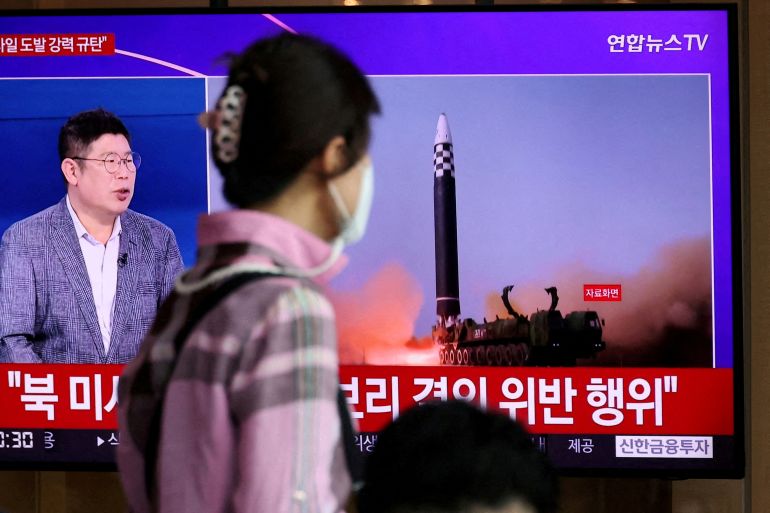US, Japan, South Korea condemn N Korea tests; US widens sanctions
Moves come after China and Russia vetoed a US-led push to tighten UN sanctions on North Korea over its ballistic missile launches.

The United States, Japan and South Korea have strongly condemned North Korea’s recent ballistic missile launches in a joint statement that followed a US move to impose sanctions on those associated with Pyongyang’s weapons programme.
A US-led effort to tighten United Nations sanctions on the North after it carried out nearly two dozen missile launches this year, was vetoed by Russia and China on Thursday.
Keep reading
list of 4 itemsNorth Korea’s COVID Outbreak | Start Here
UN Security Council sets vote on tougher North Korea sanctions
North Korea shuns outside help as COVID catastrophe looms
It was the first public split in the Security Council over North Korea since the initial sanctions were imposed in 2006.
“The DPRK has significantly increased the pace and scale of its ballistic missile launches since September 2021,” US Secretary of State Antony Blinken, Japanese Foreign Minister Hayashi Yoshimasa, and South Korean Foreign Minister Park Jin said in the statement released on Saturday morning, referring to the country by the initials of its formal name the Democratic People’s Republic of Korea.
“Each of these launches violated multiple UNSC [United Nations Security Council] resolutions and posed a grave threat to the region and the international community. We urge the DPRK to abide by its obligations under UNSC resolutions and immediately cease actions that violate international law, escalate tensions, destabilize the region, and endanger the peace and security of all nations.”
The US sanctions targeted “supporters of the DPRK’s WMD and ballistic missile programmes, as well as foreign financial institutions that have knowingly provided significant financial services to the DPRK government,” Under Secretary of the Treasury for Terrorism and Financial Intelligence Brian E Nelson said in a statement.
The sanctions designated the Far Eastern Bank and Bank Sputnik, both Russian institutions, for carrying out transactions for North Korean organisations.
The US Treasury also sanctioned Jong Yong Nam, who is based in Belarus for an organisation connected with the already-blacklisted North Korea Second Academy of Natural Sciences (SANS) and Air Koryo Trading Corporation (AKTC), which it said was being used to supply the Ministry of Rocket Industry with electrical components and dual-use goods, such as transistors and hydraulic system components. AKTC was also used to ship luxury goods to North Korea, it added.
North Korea’s mission to the United Nations in New York did not immediately respond to a request for comment from the Reuters news agency.
“The United States will continue to implement and enforce existing sanctions while urging the DPRK to return to a diplomatic path and abandon its pursuit of weapons of mass destruction and ballistic missiles,” Nelson added.
Talks on denuclearisation have been stalled since a summit between North Korean leader Kim Jong Un and then US President Donald Trump collapsed in Vietnam in 2019.
His successor, Joe Biden, has offered talks without conditions, but Pyongyang has shown little interest in returning to the negotiating table.
The US, South Korea, and Japan stressed they remained open “to meeting with the DPRK without preconditions” and would strengthen trilateral cooperation towards achieving the complete denuclearisation of the Korean Peninsula.
They also said they “deeply regret” the failure of the Security Council draft resolution, noting that the 13 members of the 15 member council had supported it. The issue will now be considered at the UN General Assembly.